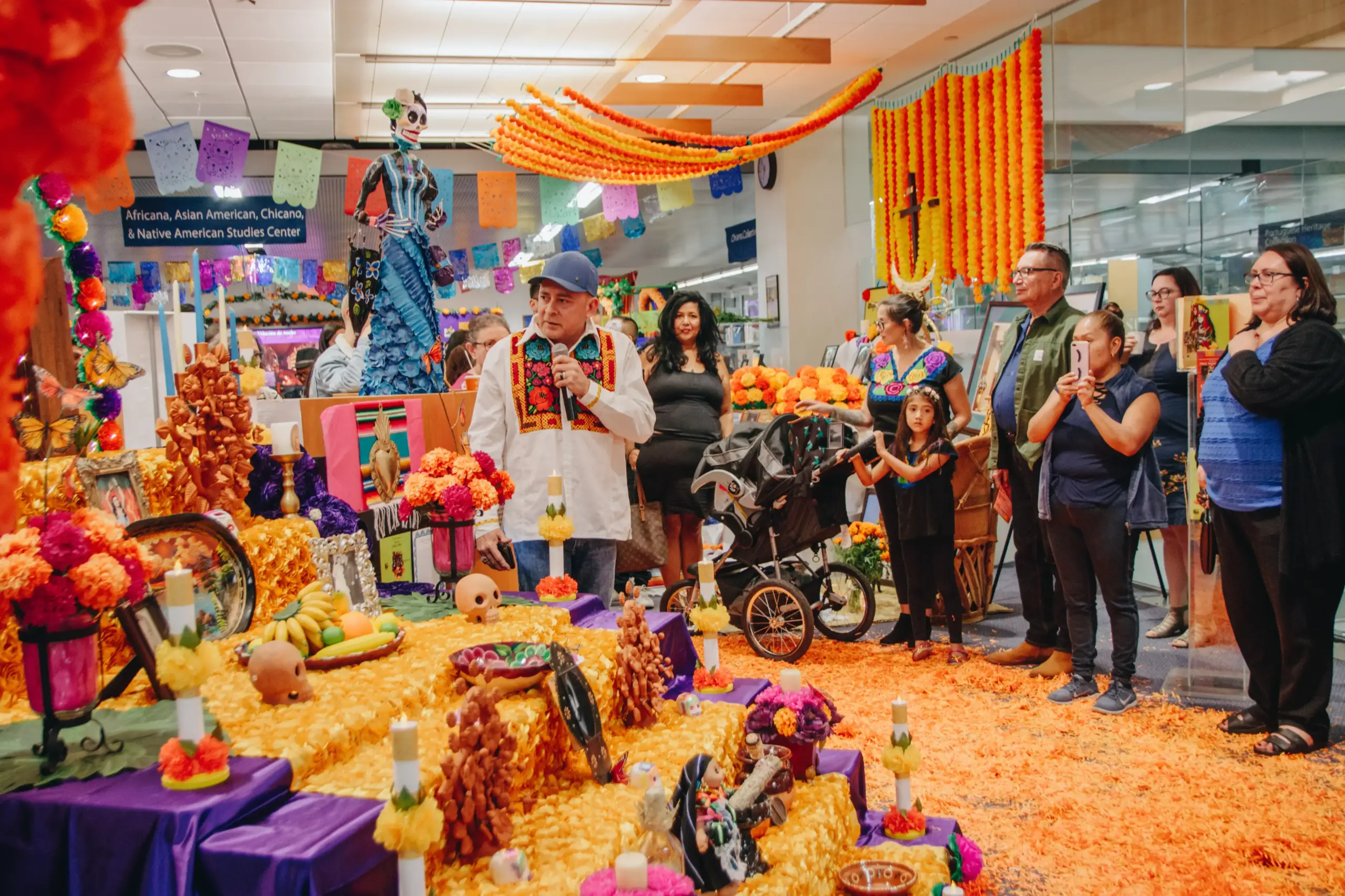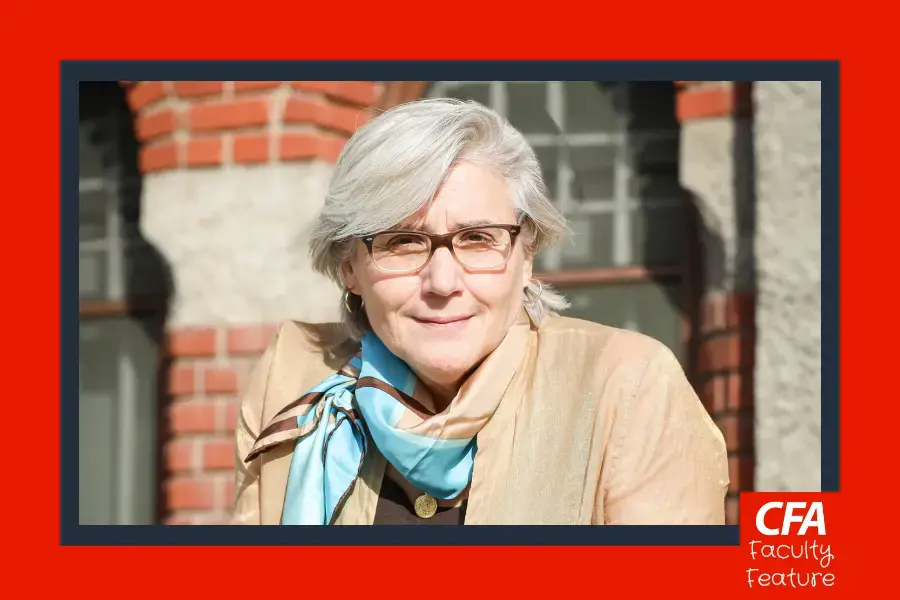Faculty Feature: Ethnic Studies at The San José State Library
For 15 years, Kathryn J. Blackmer Reyes has been the Director of the Africana, Asian American, Chicano, and Native American Studies Center at San José State University. Her career as a librarian for 25 years has been motivated by applying Ethnic Studies principles to her craft as a librarian.
As a CFA activist, Blackmer Reyes wants to engage with folks in conversations on how to improve our society through our work at the CSU. To get to that place of critical dialogue, it’s important to come armed with a broad perspective. Blackmer Reyes insists that you cannot rely on books alone, she believes that when we widen our views, we have a chance at meaningful dialogue. To gain perspective she argues that, “you have to feed your soul with art, culture, and music.”

Photo Credit: SJSU King Library Marketing Team
Designing and building exhibitions nourishes Blackmer Reyes.
“I don’t have a traditional space, so I have to recreate the space. I think that’s the beauty of it,” said Blackmer Reyes. “I am very fortunate that the community has allowed me to bring them into a space like this.” She explained that there is “no cost” to the library, “the only investment is my time.”
Reflecting on her leadership CFA San José Chapter President and lecturer Ray Buyco explained that, “Ms. Blackmer Reyes is a modern leader. She is patient and leads by listening carefully to find a pathway to consensus. Educators can be a difficult bunch, yet Kathryn has a talent for bringing disparate people together.”
The exhibitions Blackmer Reyes curates and collections she develops reflect the complex landscape of place, community, and identification in San Jose.
A recent exhibition on Chuck Alexander explains the hostility towards Black athletes during California’s Jim Crow era.
Alexander came to San José in the 1950s to be part of the track team. He quickly discovered that he couldn’t live on campus due to Jim Crow laws. With his father’s help, Alexander located a house right off campus that ended up housing Black athletes. It became known as the Good Brothers House. Alexander’s life revolved around that house since he married his wife, and they raised a family there. He would also become a fixture within the San Jose Black church community. Sadly, he passed away before the exhibit premiered.
Notably, 1968 Olympic track legends Tommy Smith and John Carlos found refuge at the Good Brothers House.

Blackmer Reyes’s work speaks to the importance of what an archive is and what a library does to preserve community, perspective, and ground the experience of everyday working people.
“The beauty of being able to build collections is that you must listen to the students. You have to listen to the faculty. In many cases, you have to anticipate and guess a little because you want the material to be there before the students know it will be a topic for them,” she said.
“The beauty of being able to build collections is that you must listen to the students. You have to listen to the faculty.
– Kathryn J. Blackmer Reyes
Lately, Blackmer Reyes has become an enthusiast of comic books. She has been slowly amassing comics from diverse writers, primarily from the Chicanx/Latinx community. Blackmer Reyes noted that it was a struggle for early Chicano scholars to get work published by academic presses. The hard-fought cannon established by these early scholars set a foundation that helped make comic books a valid contribution, through alternate publishing means, to an academic library.
Blackmer Reyes is also thinking about skateboarding zines as a subsequent collection. Skateboards are woven into working-class ethnic politics, and it’s rarely recognized. Capturing youth perspective through these mediums of art will be exciting.
“With skateboards the street is your playground. So, it’s the same idea as the comics; you’re getting artistic people who tell the story directly without the academy mediating,” said Blackmer Reyes.
In this way, Blackmer Reyes supports the research agenda of Ethnic Studies by applying that practice to library collections and exhibitions.
Recently Blackmer Reyes was recognized with the I Love My Librarian Award, an initiative of the American Library Association (ALA). ALA is the premiere advocacy organization for librarians and libraries, focusing on, among other things, policies that expand literacy and freedom of the press.
Since 2008, across the United States library users have shared more than 23,000 nominations detailing how librarians have gone above and beyond to promote literacy, expand access to technology, and support diversity and inclusion in their communities.
Blackmer Reyes was selected from more than 1,500 nominations from library users nationwide for the 2023 award.
While the recognition is meaningful to Blackmer Reyes, “it’s been something that I’ve been doing for 25 years as a librarian.” Award or no award, Blackmer Reyes, does what she always has done. In that respect, the award reflects how the profession has caught up with her grounding in Ethnic Studies.
An individual award also seems precarious since her values have been shaped by the people she has been organizing these events with.
“I see it as certainly a recognition of the work I’ve done, but I think, for me, it’s the recognition of everything that people have given me,” said Blackmer Reyes.
Ultimately, she sees the award as something that “speaks to a lot of my values that I’ve brought as a librarian.”
All the organizing that has happened to apply Ethnic Studies values to a library is deeply contingent on forging strong bonds through meaningful relationships.
“Our values come from relationships. So, let’s be really thoughtful about the relationships that we have. And be even more thoughtful of how we relate to each other,” Blackmer Reyes explained. “Say hello and smile at people.”
Join California Faculty Association
Join thousands of instructional faculty, librarians, counselors, and coaches to protect academic freedom, faculty rights, safe workplaces, higher education, student learning, and fight for racial and social justice.